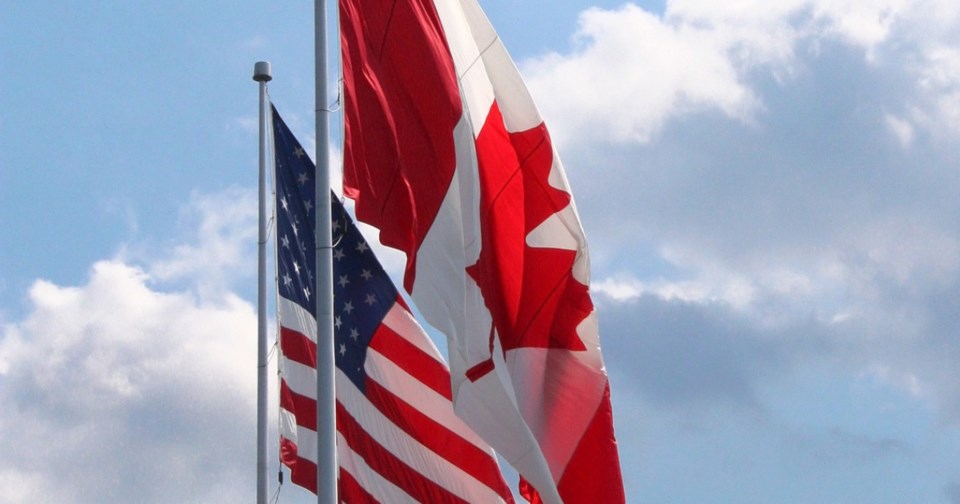Canada's distinct national identity may be contributing to this country weathering the COVID-19 crisis better than our American neighbours, say political scientists.
It isn’t about beavers or the maple leaf, but our mottos may provide a window into understanding how we're faring.
The mottos of the two countries – “Peace, order and good government” versus “Life, liberty and the pursuit of happiness” – reflect distinct political cultures and differing public relationships to government, said UNB political scientist Paul Howe.
Canada’s motto “puts a greater premium on the role of government in maintaining social order and public well-being and this crisis highlights this,” says Howe.
“We’ve always been more accepting of a stronger hand for government and working together on things,” says Howe. “The U.S. has a greater premium placed on individual rights and liberties and the right to do things the way you wish or do them differently on a local basis. In the United States, people have more of a right to make their own decisions, deciding what’s good for them, and that obviously has some consequences for the public good.”
We have already seen the strong pursuit of both individual rights and state rights manifest during the crisis, Howe said.
“In the U.S., there’s actually a fairly strong sense of the rights of states. In certain respects, they’re really heavily decentralized,” said Howe. “So how all this plays out in terms of COVID responses is that there are still some states not telling all these citizens to stay home.”
Canada has a federal system but despite regionalism often being a topic of discussion, the response to the pandemic has been fairly consistent nationally, and quick.
“In Canada, all the provinces got on board fairly quickly with roughly the same measures," said Howe. There was "some variation, but fairly quickly they all fell in line. So there wasn’t really a need for the federal government to step in and say, ‘Look we need to be doing this properly.’”
Provinces are not competing against each other in the same way for resources that states are, and premiers are speaking about redistribution of resources to other provinces regularly and publicly, Howe said, noting this is reminiscent of equalization payments and the idea of levelling the playing field that is rooted in our identity.
UNB political scientist J.P. Lewis notes that the Canadian system and political culture has also allowed for cross-party participation at this time. “In New Brunswick, they’ve actually sworn in opposition leaders into this special committee they have.”
“The United States is leaps and bounds ahead of Canada in terms of growing partisanship,” said Lewis. The prevalence of partisanship within their political culture may have contributed to the stubbornness about holding elections, such as Wisconsin’s decision to proceed with theirs amid the pandemic, creating challenges for social distancing. By contrast, New Brunswick had a municipal election planned, and the possibility of a provincial vote, but both were quickly postponed, Lewis said.
Citizen compliance with government directives has also been critical in any country’s response to COVID-19 and this is often rooted in trust, says Howe. But according to the Edelman Trust Barometer, distrust of government and institutions is at higher levels in the United States than in Canada.
“This trust is a very important resource for governments, if people trust their government they are more likely to follow along with what they are being told they should do or have faith that the government knows what they’re doing when they’re handling a crisis situation. And so, I think that Canada is ahead of the game on that count,” says Howe.
Canadians are not typically thought of as being as patriotic as those from many from other countries globally – except maybe when they are mistaken for Americans while travelling overseas – but a crisis can change things for a country.
“A strong fairly coordinated response to a crisis certainly is something that can build a sense of national identification and tie in, in much the same way as a war has in many instances,” says Howe. “Countries come out of wars with a stronger sense of national identity as a result of having effectively mobilized against an enemy.” In this case, the enemy would be the virus.
So could the crisis strengthen Canadian identity?
“I suspect it could,” says Howe. The Canadian handling of the crisis “could stand as a kind of lesson for Canadians to sort of take a certain pride in that we managed to weather the crisis better by working together.” The crisis also reinforces other sources of pride Canadians already have such as the public health care system that the United States does not possess




